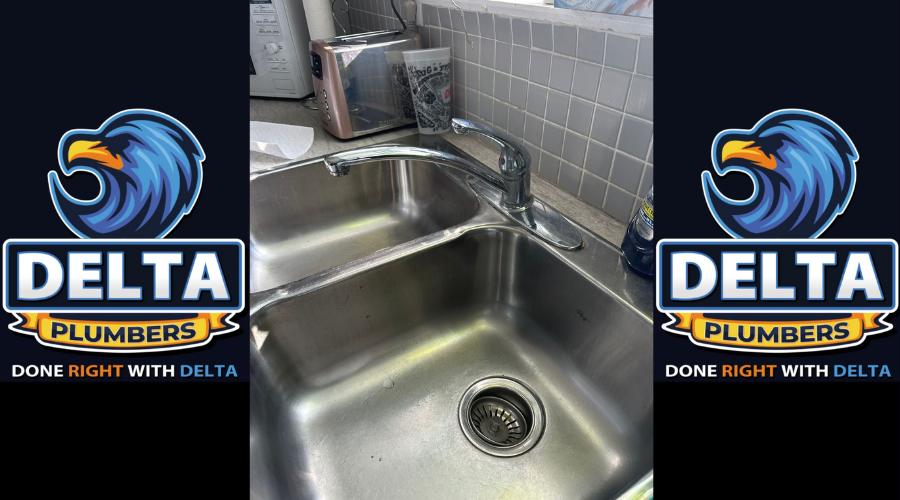A kitchen remodel can be one of the most rewarding home improvement projects, offering a chance to enhance functionality, style, and value. However, successful remodeling requires careful planning, particularly when it comes to plumbing. Plumbing is the backbone of your kitchen’s operations, affecting everything from your sink and dishwasher to water pressure and drainage. In this blog, we’ll provide a detailed guide to plumbing considerations for a kitchen remodel. Following these tips will help you avoid common pitfalls and ensure your renovation goes smoothly.

Picture Source – Delta Plumbers
In What Order Should You Remodel a Kitchen?
Remodeling a kitchen involves many moving parts, and tackling them in the right order is essential for efficiency and cost-effectiveness. Here’s a step-by-step breakdown:
1. Design and Planning:
Begin with a comprehensive plan. Map out your dream kitchen, keeping functionality, plumbing needs, and building codes in mind. Decide on the layout, choose materials, and determine where fixtures and appliances will be installed. Collaborate with professional plumbers to ensure your plumbing layout complements your design.
2. Demolition:
Once the design is finalized, start by removing old cabinetry, countertops, flooring, and plumbing fixtures. Take care to avoid damaging existing pipes or electrical systems that might still be usable.
3. Plumbing and Electrical Work:
This is where plumbing takes center stage. Install new water lines, drains, and vent pipes. Upgrade outdated pipes and ensure all plumbing complies with local regulations. Completing this step before finishing walls and floors saves time and money.
4. Flooring and Walls:
After the plumbing and electrical systems are in place, install flooring and finish walls. This step creates a polished base for the cabinetry and appliances.
5. Cabinets and Countertops:
Install cabinets and countertops while ensuring that cutouts for sinks, faucets, and appliances align perfectly with the plumbing.
6. Fixtures and Appliances:
Place appliances such as dishwashers, refrigerators, and stoves. Install plumbing fixtures like the sink and faucet. This step requires professional plumbers to make precise connections.
7. Finishing Touches:
Complete the renovation with details like backsplash installation, painting, hardware, and lighting fixtures. Double-check that all plumbing systems are functioning properly.
Also Read: Professional Water Heater Maintenance

Picture Source – Delta Plumbers
What Is the Hardest Part of the Kitchen Remodel?
A kitchen remodel combines creativity, practicality, and technical expertise, which can lead to challenges. Here are the most difficult aspects:
1. Relocating Plumbing and Electrical Systems:
Moving plumbing lines or outlets to accommodate new layouts often requires substantial effort and expertise. For instance, relocating a sink may involve rerouting water supply and drainage pipes, which can be labor-intensive and costly.
2. Balancing Aesthetics with Functionality:
Achieving a visually stunning kitchen that also meets your daily needs is a balancing act. It’s essential to choose fixtures and designs that align with your lifestyle while maintaining functionality.
3. Unforeseen Issues:
During demolition, hidden issues such as old, corroded pipes, water damage, or structural weaknesses may surface. Addressing these problems can extend timelines and inflate budgets.
4. Coordination of Tasks:
Timing is critical. For instance, plumbing and electrical work must be completed before cabinets are installed, but delays in one area can disrupt the entire schedule.
To navigate these challenges, work closely with experienced professionals like Delta Plumbers to anticipate and overcome obstacles.
Also Read: Same-Day Kitchen Sink Installation

Picture Source – Delta Plumbers
What Plumbing Is Needed for a Kitchen?
A functional kitchen depends on a robust plumbing system. The essential components include:
1. Water Supply Lines:
These deliver fresh water to your sink, dishwasher, refrigerator, and other fixtures. If you’re upgrading appliances, you might need to install additional supply lines or replace old ones.
2. Drainage System:
A reliable drainage setup removes wastewater efficiently. Proper venting prevents clogs and backflows, ensuring smooth operation.
3. Gas Lines:
If your kitchen includes a gas stove or oven, ensure the gas lines are installed or relocated safely. Professional plumbers will confirm compliance with safety standards.
4. Shut-Off Valves:
Every fixture and appliance should have its own shut-off valve for quick and easy maintenance.
5. Specialized Connections:
Appliances like refrigerators with ice makers or dishwashers need specific plumbing connections. Ensure these are installed accurately to prevent leaks.
Delta Plumbers offers expert guidance to determine and implement all necessary plumbing upgrades for your remodel.
Also Read: How to Fix a Leaking Hose Bib: A Comprehensive Guide by Delta Plumbers

Picture Source – Delta Plumbers
How Easy Is It to Move Plumbing in a Kitchen?
The ease of moving plumbing depends on your kitchen’s existing layout and the complexity of your remodel.
1. Minimal Adjustments:
If your new design maintains the current locations of sinks, dishwashers, and other fixtures, you’ll avoid major plumbing work. Minor adjustments, such as upgrading pipes or adding shut-off valves, are relatively straightforward.
2. Major Changes:
Moving a sink or dishwasher to a different wall requires extending or rerouting water supply and drain pipes. In homes with a concrete slab foundation, this can involve cutting into the slab, which increases labor and costs.
3. Code Compliance:
Plumbing changes must adhere to local building codes. Delta Plumbers ensures that all modifications meet these regulations, minimizing future issues.
While moving plumbing can be challenging, it offers flexibility in designing your ideal kitchen layout. Working with skilled professionals simplifies the process and keeps costs under control.
Also Read: Broken Garburators: A Complete Guide on How to Deal With

Picture Source – Delta Plumbers
What Is the Rule of Thumb for a Kitchen Remodel?
Adhering to these rules of thumb ensures a successful remodel:
1. Budget Wisely:
Allocate 5-10% of your home’s value for the kitchen remodel. This range provides a balance between affordability and return on investment.
2. Optimize the Layout:
Design a kitchen that prioritizes workflow. The “kitchen work triangle” is a popular guideline that places the sink, stove, and refrigerator within easy reach.
3. Plan Plumbing Early:
Incorporate plumbing requirements into the initial design phase to prevent costly changes later.
4. Choose Durable Fixtures:
Invest in high-quality faucets, pipes, and appliances. Durable materials reduce maintenance and improve the lifespan of your kitchen.
5. Hire Professionals:
Partner with experts like Delta Plumbers to ensure precision and adherence to safety standards.
Also Read: The Role of Plumbing in Smart Homes

Picture Source – Delta Plumbers
What Do I Wish I Knew Before Remodeling My Kitchen?
Here’s what many homeowners realize in hindsight:
1. Unforeseen Plumbing Issues:
Older homes may have outdated plumbing systems that cannot handle modern appliances. Upgrading pipes and fixtures during the remodel ensures compatibility.
2. Fixture Placement Matters:
The location of sinks and appliances has a significant impact on plumbing costs. Plan strategically to minimize extensive pipe rerouting.
3. Permit Requirements:
Remodeling often requires permits and inspections. Professional plumbers can handle this for you, ensuring compliance.
4. Cost of Delays:
Delays in one area, such as cabinetry, can hold up plumbing installation. Proper scheduling minimizes downtime.
Also Read: How to Repair a Broken Pipe: A Complete Guide by Delta Plumbers

Picture Source – Delta Plumbers
What Is the Biggest Expense in a Kitchen Remodel?
Kitchen remodels are significant investments, with some elements accounting for a larger share of the budget:
1. Cabinetry:
Custom cabinets are the most expensive component, often representing 30% of the budget. Choosing semi-custom or stock options can reduce costs.
2. Countertops:
High-end materials like granite, quartz, or marble come at a premium but offer durability and elegance.
3. Plumbing Upgrades:
Moving pipes or installing new fixtures adds to the cost. Collaborating with Delta Plumbers ensures efficient installations.
4. Labor Costs:
Skilled labor, including plumbers and electricians, is essential for a successful remodel. Quality work may come at a higher cost but ensures lasting results.
Conclusion
Remodeling your kitchen is an exciting venture that requires careful planning and expert execution. Plumbing plays a central role, influencing functionality and cost. By following these tips and working with a trusted plumbing team like Delta Plumbers, you can achieve a kitchen that combines beauty and practicality. Let us help you turn your vision into reality.









